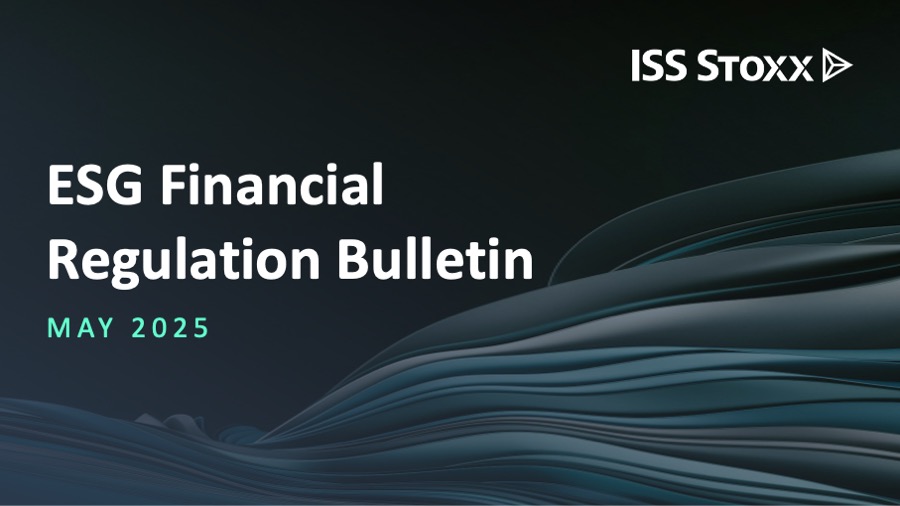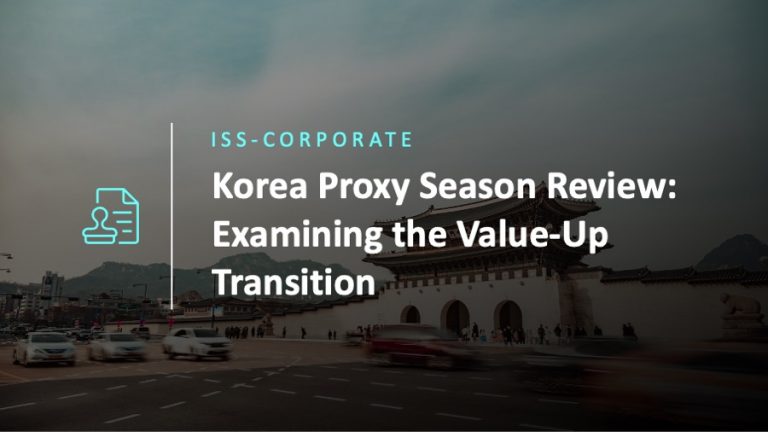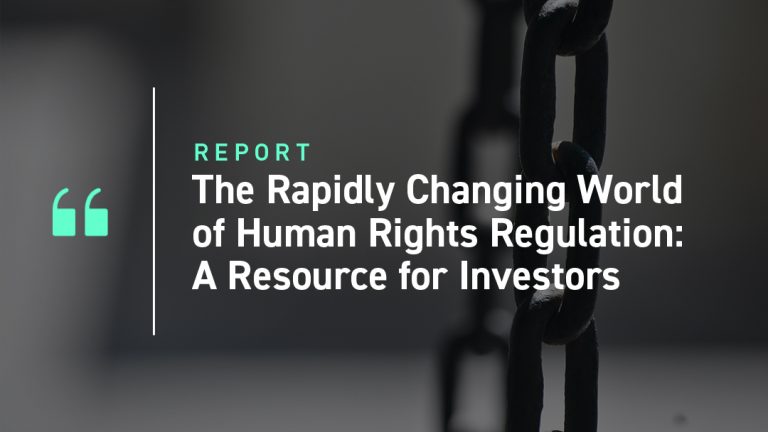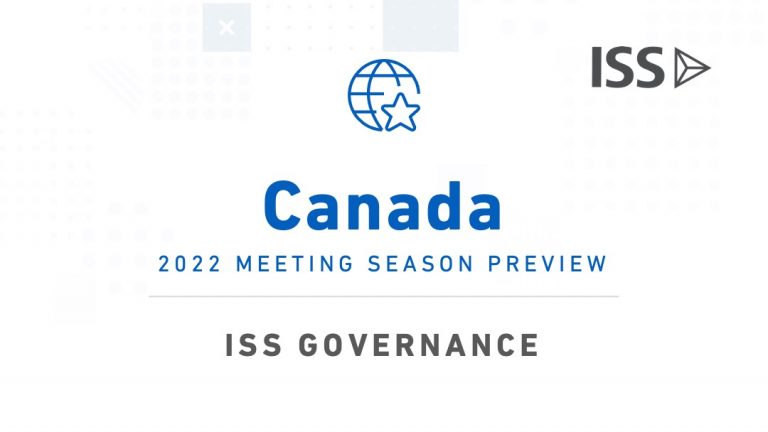
ISSB
Taskforce on Nature-related Financial Disclosures and International Financial Reporting Standards Foundation Formalize Collaborative Partnership
The Taskforce on Nature-related Financial Disclosures (TNFD) and the International Financial Reporting Standards (IFRS) Foundation signed a memorandum of understanding (MoU) on April 9. The IFRS Foundation and TNFD will engage in joint capacity building initiatives to improve nature-related disclosures by financial market participants; the two organizations will also collaborate on research and technical expertise as the IFRS Foundation “will consider the relevance of TNFD recommendations in meeting the needs of global capital markets.”

Hong Kong
Securities and Futures Commission and Hong Kong Exchanges and Clearing Limited Host International Carbon Markets Summit
The Securities and Futures Commission (SFC) and the Hong Kong Exchanges and Clearing Limited (HKEX) jointly hosted Hong Kong’s first International Carbon Markets Summit on April 15 to address challenges and opportunities in scaling global voluntary carbon markets. The SFC and HKEX hosted more than 200 regulators, corporate issuers, investors, and other market participants to discuss how to expand cross-border transactions in voluntary carbon markets and how to develop technologies to facilitate the growth of these markets. Speakers at the International Carbon Markets Summit emphasized the necessity to harmonize “standards and best practices in credit issuance and secondary trading” across different jurisdictions.
Malaysia
Bank Negara Malaysia Collaborates with International Organizations to Publish Playbook on Greening Value Chains for Association of Southeast Asian Nations Markets
Bank Negara Malaysia, the Asian Development Bank (ADB), and the United Nations Development Programme (UNDP) jointly published a playbook on April 10 titled “Building Supply Chain Resilience: Insights into Greening Value Chains for ASEAN.” The playbook offers guidance for corporate issuers, industry participants, development institutions, and policymakers on which programmes can “support businesses to accelerate decarbonisation and strengthen supply chain resilience.” Bank Negara Malaysia, the ADB, and the UNDP developed the playbook as part of the Association of Southeast Asian Nations (ASEAN) 2025 Finance Track’s Priority Economic Deliverables; the playbook utilizes the Joint Committee on Climate Change (JC3) initiative on Greening Value Chains in Malaysia as a case study on effective programme development for greening value chains.
ASEAN
ASEAN Secretary-General Addresses the Malaysian Securities Commission on ASEAN’s Sustainability-Related Policy Priorities for 2025
The Secretary-General of ASEAN, Dr. Kao Kim Hourn, gave the keynote address at the Malaysian Securities Commission’s (SC) “Connecting Capital, Unlocking Opportunities, and Driving Sustainability” Conference on April 9. In his address, Dr. Kao Kim Hourn outlined ASEAN’s 2025 initiatives focused on “inclusivity and sustainability.” Among key policy priorities for 2025, ASEAN will seek to advance its sustainable investment policy and unlock increased international sustainable investments by continuing the development of the ASEAN Taxonomy for Sustainable Finance; finalizing the “Policy Recommendation on Guidelines to Support ASEAN EV Implementation Roadmap and the ASEAN Sustainable Investment Guideline (ASIG)”; and establishing and developing capital markets for sustainable bonds and loans to sustainable investment projects in Southeast Asia.
ASEAN Capital Markets Forum Releases Simplified ESG Disclosures Guidance for SMEs in Supply Chains
The ASEAN Capital Markets Forum (ACMF) published a guide on April 11 covering how small- to medium-sized enterprises (SMEs) should disclose ESG-related information when they are part of a larger supply chain. The ASEAN Simplified ESG Disclosure Guide for SMEs in Supply Chains (ASEDG) Version 1 maps out the reporting requirements of the IFRS Sustainability Disclosure Standards, the Global Reporting Initiative (GRI) Standards, and the local ESG disclosure requirements of each ASEAN member nation to provide “a set of 38 priority disclosures which SMEs can consider tracking and reporting against.” The ASEDG Version 1 organizes the consolidated disclosures through five sub-topics under the Environmental, Social, and Governance Pillars; each recommendation is accompanied with reporting guidance and linked to the relevant frameworks that require the disclosure.
Meeting of ASEAN Finance Ministers & Central Bank Governors Promotes Initiatives to Advance Sustainable and Inclusive Growth
Representatives from Bank Negara Malaysia and the Malaysian Finance Ministry jointly hosted the 12th ASEAN Finance Ministers’ and Central Bank Governors’ Meeting (AFMGM) on April 10 in Kuala Lumpur. Among the key areas of focus for the AFMGM, the participants discussed initiatives to support three sustainability-related policy priorities: “(i) Catalysing Access to Finance for Just Transition and Climate-Resilient ASEAN; (ii) Accelerating the Growth of a More Sustainable, Connected and Inclusive ASEAN Capital Market; and (iii) Fostering Inclusive Instant Payment Connectivity in ASEAN.” AFMGM participants discussed their ongoing support for policy initiatives such as the ASEDG Version 1 and the ASEAN Greening Value Chain Playbook.
Australia
Australian Securities & Investments Commission Publishes Sustainability Reporting Regulatory Guide
The Australian Securities & Investments Commission (ASIC) published on March 31 the Regulatory Guide 280 Sustainability Reporting (RG 280), which provides companies, superannuation entities, and other relevant parties guidance on how “to prepare a sustainability report containing climate-related financial information under Chapter 2M of the Corporations Act 2001.” RG 280 covers information related to who is in scope of climate-related disclosure requirements, what information must be included in a sustainability report, climate-related disclosures required outside of a sustainability report, and ASIC supervision of climate-related disclosures. The finalized RG 280 reflects feedback that ASIC received on its draft guidance consultation and includes additional guidance on ASIC’s approach to regulatory supervision, labelling requirements, directors’ responsibilities in climate-related reporting, mandatory disclosure requirements outside of sustainability reports, reporting thresholds, and climate scenario and scope 3 greenhouse gas emissions disclosure requirements.
Alongside RG 280, ASIC also published an FAQ document on March 31 covering information for small businesses on the new sustainability reporting requirements. The FAQ document covers how new climate-related reporting requirements will directly and indirectly affect Australian businesses of different sizes.

EU
European Commission Publishes New Documents to Simplify the Implementation of the EU Deforestation Regulation
The European Commission (the Commission) published guidance and FAQ documents, as well as a new Delegated Act, on April 14 to clarify and simplify requirements related to the EU Deforestation Regulation (for more information on the EU Deforestation Law, see November Newsletter). The guidance and FAQ documents are designed to simplify and clarify how subject companies should demonstrate that “their products are deforestation free”; meanwhile, the Delegated Act clarifies the scope of the Deforestation Regulation and includes details on the specific categorization of products under the regulation. The Commission will now aim to finalize “the country benchmarking system [for the Deforestation Regulation] through an Implementing Act” that will be adopted before June 30. Overall, the Commission hopes for a 30% reduction of the administrative burden and cost through its simplification efforts. The EU Deforestation Regulation is scheduled to apply starting at year-end.
European Securities and Markets Authority Publishes the Conclusions of its Common Supervisory Action on Benchmark Administrators’ ESG Disclosures
The European Securities and Markets Authority (ESMA) released the outcome of a Common Supervisory Action (CSA) on April 9 assessing the ESG disclosures of benchmark administrators (BMAs) under the EU Benchmark Regulation (BMR). The CSA, launched in December 2023 by ESMA and conducted with EU Member States’ National Competent Authorities (NCAs), aimed to identify best practices and clarify regulatory expectations relating to the disclosure of ESG information by BMAs in benchmark statements and methodologies. As part of the CSA report, ESMA proposed potential amendments to the technical provisions of the BMR designed to “alleviate the regulatory burden on benchmark administrators.” ESMA also assessed the broader sustainable finance ecosystem and suggested recommendations to enhance the “transparency and comparability of ESG information [disclosed by BMAs] for the benefits of users of benchmarks.” ESMA now intends to collaborate with the Commission and NCAs to follow up on its policy recommendations and utilize its “supervisory convergence tools” to promote and enforce ESG disclosures’ quality though BMAs regulated under BMR.
European Supervisory Authorities Publish 2024 Annual Report
The European Supervisory Authorities (ESAs), comprising ESMA, the European Insurance and Occupational Pensions Authority (EIOPA), and the European Banking Authority (EBA), published their 2024 annual report on April 16. The Annual Report covers the ESAs’ regulatory and supervisory achievements in 2024 and includes a section focused on sustainable finance-related actions taken by the ESAs. The Annual Report specifically identifies initiatives taken by the ESAs on the Sustainable Finance Disclosure Regulation (SFDR), including the publication of a joint opinion on the review of SFDR; the release of Q&As on the SFDR Delegated Regulation; and the finalization of a third annual report on PAI disclosures under Article 18 of the SFDR.
European Parliament & Council of the EU Vote to ‘Stop-the-Clock’ on the Application Dates of Sustainability Reporting and Due Diligence Legislation
Two legislative bodies of the European Union, the EU Parliament and the Council of the EU, approved on a fast-track basis the Commission’s proposal to delay the implementation of the Corporate Sustainability Reporting Directive (CSRD) and the Corporate Sustainability Due Diligence Directive (CSDDD). The votes follow the European Commission’s two Omnibus proposals in February 2025: the first Omnibus proposal would ‘stop-the-clock’ on the implementation of CSRD and CSDDD, while the second would greatly reduce the scope and reporting requirements of CSRD, CSDDD, and the EU Taxonomy (for more information on the Commission’s omnibus proposals, see March Newsletter). Under the ‘stop-the-clock’ Omnibus legislation, the application of CSRD to large companies that have not begun reporting, as well as listed SMEs, will be delayed by two years; meanwhile, the application and transposition deadline of the CSDDD will be delayed by one year. The Council of the EU approved the ‘stop-the-clock’ omnibus proposal on April 14, while the European Parliament passed the same measure on April 3.
European Financial Reporting Advisory Group Seeks Input on Revisions to the European Sustainability Reporting Standards
Following its February Omnibus proposals, the Commission charged the European Financial Reporting Advisory Group (EFRAG) with a mandate to provide technical advice on the revision and simplification of the European Sustainability Reporting Standards (ESRS) under the CSRD. EFRAG published an online questionnaire on April 8 to gather public input on key areas of simplification identified by the Omnibus proposal. The EFRAG questionnaire seeks feedback on which ESRS mandatory datapoints are least consequential; which ESRS provisions are unclear; how to improve consistency between ESRS and other EU legislation; how to strengthen the materiality threshold for reporting; how to enhance the interoperability of ESRS with other global standards; and how to simplify “the structure and presentation of the standards.” The deadline to provide feedback is May 6.

US
The Securities and Exchange Commission Votes to End its Legal Defense of Climate-Related Disclosure Rules
The U.S. Securities and Exchange Commission (SEC) announced on March 27 that it voted to stop the legal defense of its rules on “the Enhancement and Standardization of Climate-Related Disclosures for Investors,” which were adopted on March 6, 2024. According to the press release, the rules create a “detailed and extensive special disclosure regime” for climate-related risks of public companies (for more information on the SEC Climate Rule and ongoing legal challenges to the rule, see the ISS-Corporate post, “SEC Adopts Climate Disclosure Rule: Key Takeaways for Corporates,” and the March Newsletter). SEC Acting Chairman Mark T. Uyeda explained that “the goal of today’s Commission action and notification to the court is to cease the Commission’s involvement in the defense of the costly and unnecessarily intrusive climate change disclosure rules.” The press release also announced that following the SEC vote, SEC staff sent a letter to the Eighth Circuit Court confirming that the SEC has withdrawn its defense of the rule.
A federal appeals court suspended the litigation on April 24, directing the SEC to file within 90 days a status report “advising whether the Commission intends to review or reconsider the rules.” Democratic attorneys general from more than a dozen states, who intervened in the litigation to defend the rules, asked the court earlier in April to pause the litigation while the SEC evaluates its course of action.
Brazil
Brazilian Ministry of Finance Promotes Integration of International Carbon Markets at Climate Forum
The Brazilian Finance Ministry (Ministério da Fazenda; MF) announced on April 14 that they will propose the integration of carbon markets among Brazil, China, California, the EU, and other select nations at the 30th United Nations Climate Change Conference (COP 30). Rafael Debeux, Deputy Executive Secretary of the MF, announced the proposal at the Climate Governance and Development Forum. Debeux revealed that dialogue between participating parties had already begun and that more nations would be invited to integrate their carbon markets as the regime developed. Also at the Climate Governance and Development Forum, Cristina Froes Reis, Undersecretary for Sustainable Economic Development for the MF, presented a “roadmap for implementing the Brazilian Greenhouse Gas Emissions Trading System.”
By:
Noam Cherki, Associate, Regulatory Affairs & Public Policy, ISS STOXX
Hugo Gallagher, Senior Associate, Regulatory Affairs & Public Policy, ISS STOXX
Karina Karakulova, Director of Regulatory Affairs & Public Policy, ISS STOXX




